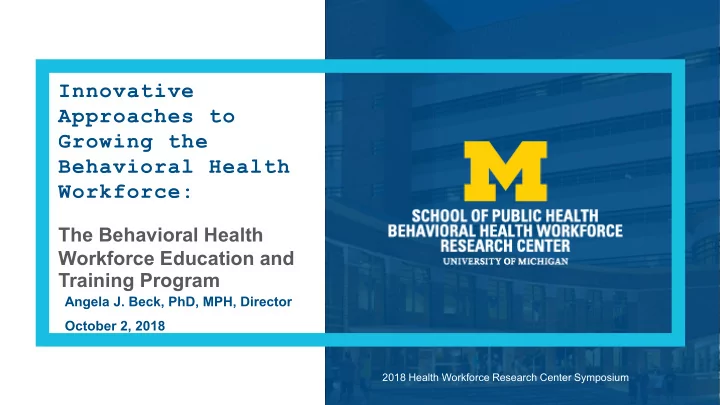

Innovative Approaches to Growing the Behavioral Health Workforce: The Behavioral Health Workforce Education and Training Program Angela J. Beck, PhD, MPH, Director October 2, 2018 2018 Health Workforce Research Center Symposium Health Workforce Research Symposium 2018
Portfolio of Projects What are How are Who are the What Can Providers Services Providers Authorized to Providers Bill Delivered Practice Characteristics Care and Practice Settings Scopes of Delivery Reimbursement Practice Models Policies Workforce Services Development Reciprocity Pipeline Telehealth Requirements Workforce Monitoring: Data Quality; Minimum Data Sets Health Workforce Research Symposium 2018 2
BHWET Program Aims to strengthen capacity of the workforce by supporting interdisciplinary clinical internships and/field placement programs Awards made across professional and paraprofessional/certificate tracks Study purpose: determine best practices, evaluation strategies, and toolkit for the BHWET program Health Workforce Research Symposium 2018 3
Methods: BHWET Evaluation Interview Recruited 197 grantees into the study Themes Conducted 30-60 minute interviews with 53 • Student training experiences BHWET program representatives via telephone • Program evaluation strategies from June-August 2018 • Student retention practices Survey Development • Public benefit of the program Professional-level BHWET programs • Student graduate outcomes Paraprofessional-level BHWET programs • Loan forgiveness program participation Clinical training sites that host BHWET students • Toolkit ideas Health Workforce Research Symposium 2018 4
Results: BHWET Program Strengths “[Students] appreciate the opportunity to participate in the Clinical and academic instruction and trainings, seminars, the value- training in integrated behavioral added education…They like the fact health that it's hands-on and it's about Student retention practices applying knowledge and skills to practice…and to meet with Cultural competency training practitioners in the community to Substance use disorder training learn more about a particular area SBIRT of behavioral health, or to develop more specialized skills.” Patient simulation Faculty responsive to student and evaluation feedback Health Workforce Research Symposium 2018 5
Results: Areas of Opportunity “If there were evidence-based tools Standardize integrated behavioral …to use to evaluate the program, health curriculum and practice that could be helpful…if there was competencies some instrument that would be really easy for the settings we're in Distribution of verified assessments to kind of give us numbers on Recruitment of diverse student body access to care and client outcomes in the semesters that we have project participants there.” Health Workforce Research Symposium 2018 6
Results: Toolkit Feedback “It would be great to have one cloud-based repository for Cloud-based information, where you could Adaptable to programs across upload like, "Here's a brief disciplines and institutions summary of [...] our program. This is a basic idea of how we're Centralized networking database conducting our evaluation. If you're Matched mentoring opportunities interested, get in touch with us, we'd be happy to talk more and BHWET 101 guide here's our contact information." Health Workforce Research Symposium 2018 7
Next Steps Online toolkit that offers guidelines and evaluation measures applicable to BHWET programs Coordination and online resource sharing and networking opportunities for grantees in similar field and close geographic proximity Webinar series to discuss strategies for program success, tracking of program impact, student competency development, training and supervision models, evaluation strategies Health Workforce Research Symposium 2018 8
Thank You Behavioral Health Workforce Research Center University of Michigan School of Public Health 1415 Washington Heights Ann Arbor, MI 48109 www.behavioralhealthworkforce.org Angela Beck, Director: ajbeck@umich.edu Jessie Buche, Program Manager: jesbuche@umich.edu 734-764-8775 This Center is jointly supported by SAMHSA and HRSA; funded through HRSA Behavioral Health Workforce @BHWRC Cooperative Agreement U81HP29300: Research Center Health Workforce Research Centers Program. Health Workforce Research Symposium 2018 9
Recommend
More recommend